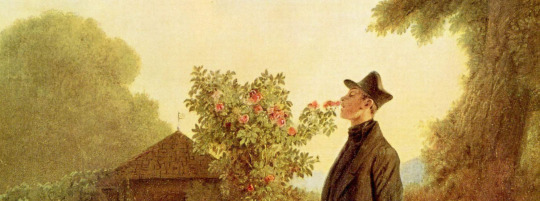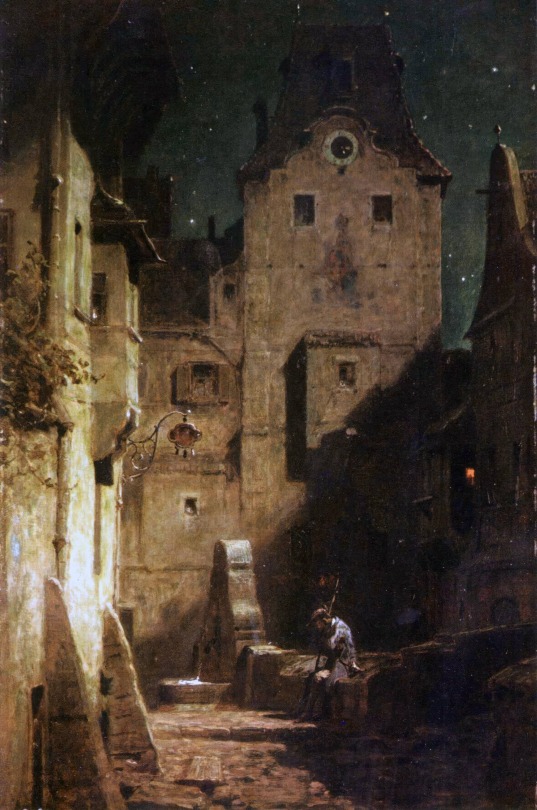#Carl Spitzweg
Explore tagged Tumblr posts
Text

Bathing Nymph by Carl Spitzweg
#carl spitzweg#art#bathing#bath#europe#european#romanticism#romantic#landscape#robe#crown#robes#dress#clothes#clothing#water#baths#mythological#mythology
1K notes
·
View notes
Photo

Carl Spitzweg (German,1808-1885)
Music-making hermit in front of his rock hermitage, 1856-1858
oil on canvas
750 notes
·
View notes
Text

Carl Spitzweg (1808-1885) "Girl with Headload" (c. 1860) Oil on paper mounted on canvas Biedermeier Currently in a private collection
#paintings#art#artwork#genre painting#genre scene#carl spitzweg#oil on paper#fine art#biedermeier#private collection#german artist#landscape#forest#woods#clothing#clothes#female portrait#portrait of a girl#1860s#mid 1800s#mid 19th century#a queue work of art
903 notes
·
View notes
Text
Word List: Night

beautiful words with "night" to try to include in your poem/story
Afternight - evening
Aleknight - obsolete: tippler (i.e., one who drinks liquor especially by habit or to excess)
Benight - to overtake by darkness or night especially before the end of a journey
Birthnight - the night in which a person is born
Knightess - obsolete: a woman filling the role of a knight either as a fighter or as a member of an order of chivalric import; female knight; the wife of a knight
Knightia - a small genus of Australasian trees or shrubs (family Proteaceae) with alternate leathery leaves, showy racemose flowers, and follicular fruit
Nightfall - the close of the day; dusk
Nightfowl - night bird
Nightjar - any of a family (Caprimulgidae) of medium-sized long-winged crepuscular or nocturnal birds (such as the whip-poor-wills and nighthawks) having a short bill, short legs, and soft mottled plumage and feeding on insects which they catch on the wing
Nightscope - an optical device usually using infrared radiation that enables a person to see objects in the dark better
Nightshade - any of a genus (Solanum of the family Solanaceae, the nightshade family) of herbs, shrubs, and trees having alternate leaves, cymose flowers, and fruits that are berries and including some poisonous weeds, various ornamentals, and important crop plants (such as the potato and eggplant)
Nighttide - nighttime; a flood tide occurring during the night
Sennight - archaic: the space of seven nights and days; week
Unbenight - archaic: to free from night or darkness
Yesternight - archaic: on the night last past
If any of these words inspire your writing, do tag me or send me a link. I'd love to read your work!
More: Word Lists
#word list#night#writing reference#spilled ink#dark academia#langblr#words#linguistics#studyblr#writing inspiration#writeblr#literature#writers on tumblr#writing prompt#poets on tumblr#poetry#writing inspo#writing ideas#light academia#carl spitzweg#writing resources
297 notes
·
View notes
Text

Night Watch (Carl Spitzweg, 1875)
580 notes
·
View notes
Text

The Eye of the Law (Justitia) by Carl Spitzweg (1857)
152 notes
·
View notes
Text

"Landscape with Mt. Wendelstein" by Carl Spitzweg, 1871
71 notes
·
View notes
Text


Carl Spitzweg - The Rose Lover // John William Waterhouse - The Soul of the Rose
#rose garden#oil on canvas#oil painting#art academia#art gallery#academic art#dark academia#light academia#moodboard#romantic#the rose lover#the soul of the rose#john william waterhouse#carl spitzweg#european art#art history#art daily#aestheticism#romanticism#romantic academia#painting#classic academia
70 notes
·
View notes
Text

The Poor Poet (1839) by Carl Spitzweg
65 notes
·
View notes
Text




THE POOR POET /1939/ by CARL SPITZWEG
Spitzweg is primarily recognized for his significance in the Biedermeier period of the mid-1800s. The middle-class thrived and expanded as Europe experienced a period of political steadiness. The prevalent art shifted to depict the middle-class and their daily routines, typically had political themes, and centered on domestic aspects of life instead.
This piece depicts a struggling poet in his room, reclining on his bed while composing his poetry. He counts the meters of his poem with his fingers, holding his quill in his mouth. At the same time, the rain is seeping through the ceiling, prevented only by a strategically positioned umbrella.
The poet reclines on his mattress on the ground, donning his night robe and a nightcap for added warmth. He resides in a cramped attic space, with his sparse belongings scattered around. The snow covering the roofs outside the room's window indicates that it is winter.
Spitzweg is mocking the concept of a poet enduring pain for their art. His art is the only thing that matters to him. When this artwork was first displayed in 1839, it faced widespread criticism for seemingly targeting not just poetry but the entirety of art. He was perceived as mocking all struggling artists.
56 notes
·
View notes
Text

Carl Spitzweg, "Girl with Goat", 1861
967 notes
·
View notes
Text

Carl Spitzweg - The antiquarian (Book seller – The antiquarian and two girls)
32 notes
·
View notes
Photo

Carl Spitzweg (German,1808-1885)
The Rose Lover, 1848
Oil on canvas
281 notes
·
View notes
Text
Carl Spitzweg - In the Alpine High Valley (Landscape with Mt. Wendelstein)

#traditional art#art history#traditional painting#classical art#classic art#art detail#art details#19th century art#oil painting#art#carl spitzweg#contemporary art#1800s art#20th century art#academic art#fine art#modern art#land#paisaje
68 notes
·
View notes
Text
Writing Notes: Amnesia

References (Types; Causes, Symptoms; Treatment; Prevention)
Amnesia—the partial or total loss of memory.
The inability of an agent to retrieve memories that would normally be retrievable.
The loss may be temporary or permanent.
Amnestic disorders - a group of disorders that involve loss of memories previously established, loss of the ability to create new memories, or loss of the ability to learn new information.
2 Types of Amnesia
Retrograde Amnesia - To the loss of memories made prior to the onset of amnesia. Often occurs in conjunction with head injury and results in erasure of memory of events or information from some time period (ranging from seconds to months to the whole of a person’s past) prior to the head injury. Over the course of recovery and rehabilitation from a head injury, memory may be restored or the period of amnesia may eventually shorten.
Anterograde Amnesia - The inability to recall events or facts introduced since the amnesia began (i.e., the inability to retain new memories). It is more common than retrograde amnesia. Although individuals with anterograde amnesia have difficulty with the establishment of memory from that time at which the amnesia started, they may clearly recall events that happened before the amnesia began. It is possible for a single individual to have both anterograde and retrograde amnesia depending on which part of the brain is damaged.
The diagnostic manual used by clinicians, Diagnostic and Statistical Manual of Mental Disorders, lists 3 classifications of amnestic disorders:
Amnestic disorder due to a general medical condition
Substance-induced persisting amnestic disorder
Amnestic disorder not otherwise specified
Dissociative Amnesia
Part of a different group of disorders, the dissociative disorders.
It manifests as an inability to remember information that is personally important but possibly traumatic or stressful.
Previously called psychogenic amnesia.
This disorder can arise in a person of any age.
The memory impairment in this disorder is reversible, and memory loss can be of several types:
It can be localized - the missing memory covers a defined period of time, or
it can be selective - only bits and pieces of a situation are recalled.
There are also 3 less common types:
generalized (memories covering a lifetime are missing)
continuous (memories are missing from a specific time period up to the present)
systematized (only memories from specific categories of information are missing, such as the names of family members)
Other Types
Transient Global Amnesia - Causes delirium (a period of waxing-and-waning confusion and agitation), anterograde amnesia, and retrograde amnesia for events and information from the several hours prior to the onset of the attack. It has no consistently identifiable cause, but researchers have suggested that migraine or transient ischemic attack (TIA) may be the trigger. The individual experiences sudden confusion and forgetfulness. Attacks can be as brief as 30 minutes or can last up to 24 hours. In severe attacks, an individual is completely disoriented and may also experience retrograde amnesia that extends back several years. While very frightening for the individual, transient global amnesia generally has an excellent prognosis for recovery, with no lasting memory deficit.
Childhood Amnesia - Coined by Anna Freud in the late 1940s, refers to the fact that most people cannot recall childhood experiences during the first 3-5 years of life. It has been suggested that this type of amnesia occurs because children and adults organize memories in different ways. The differences are based on the brain’s physical development and communication among the different areas of the brain involved in developing memory. Others believe children begin remembering facts and events once they have accumulated enough experience to be able to relate experiences to each other.
Causes
Amnesia has multiple causes.
Most cases are traceable to brain injury related to physical trauma, disease, infection, and drug and alcohol abuse.
Example: In Wernicke-Korsakoff syndrome, damage to the memory centers of the brain results from chronic use of alcohol coupled with malnutrition.
Infections that damage brain tissue, such as encephalitis, also can cause amnesia, as can stroke. Other causes include various types of dementia (e.g., Alzheimer’s disease), traumatic brain injury (e.g., concussion), accidents that involve oxygen deprivation to the brain or interruption of blood flow to the brain (e.g., ruptured aneurysms, near-drowning), tumors in the thalamus and/or hypothalamus, and seizures.
Sometimes procedures such as surgery or ECT can produce amnesia.
Dissociative amnesia is thought to be of psychological origin, caused by a psychological disorder or trauma.
Symptoms
Symptoms of amnestic disorders may include:
difficulty recalling remote events or information
and/or difficulty learning and then recalling new information.
In some cases, the individual is fully aware of the memory impairment and frustrated by it;
in other cases, the individual may seem completely oblivious to the memory impairment or may even attempt to fill in the deficit in memory with confabulation.
Depending on the underlying condition responsible for the amnesia, a number of other symptoms may be present as well.
Treatment
A neurologist and/or psychiatrist may be involved in diagnosing and treating amnestic disorders.
Depending on the underlying condition responsible for the memory deficit, other specialists may be involved as well, such as occupational and speech and language therapists may be involved in rehabilitation programs for individuals who have amnestic disorders as part of their clinical picture.
Traditional Treatments
In some cases, treatment of the underlying disorder may help improve the accompanying amnesia.
In mild cases of amnesia, rehabilitation may involve:
Teaching memory techniques.
Encouraging the use of memory tools, such as association techniques, lists, notes, calendars, and timers.
Memory exercises may be helpful.
There are no specific drugs to treat amnesia.
However, treatments for Alzheimer’s disease and other dementias, such as donepezil (Aricept), are being studied to see if they may also be effective in treating amnestic disorders.
Prevention
Amnestic disorders are preventable in so far as brain injury can be prevented or minimized. Common sense approaches include:
wearing a helmet when bicycling, horseback riding, or participating in potentially dangerous sports;
using automobile seat belts; and
avoiding excessive alcohol or drug use.
Brain infections should be treated swiftly and aggressively to minimize the damage due to swelling.
Victims of strokes, brain aneurysms, and transient ischemic attacks should seek immediate medical treatment.
NOTE
Although memory loss is often the earliest sign of a progressive dementing disorder, it is important to remember that memory loss need not be a harbinger of dementia. Therefore, it is recommended that a patient with memory change should be carefully evaluated to rule out treatable causes of the memory loss.
It should not be assumed that memory loss is just a part of normal aging.
Sources: 1 2 3 More: Writing Notes & References ⚜ On Anatomy ⚜ Memory
#writing notes#amnesia#writeblr#dark academia#spilled ink#literature#writers on tumblr#writing reference#poets on tumblr#writing prompt#poetry#creative writing#writing inspiration#writing ideas#light academia#carl spitzweg#writing resources
168 notes
·
View notes
Text

The Night Watchman Has Fallen Asleep (Carl Spitzweg, 1875)
360 notes
·
View notes